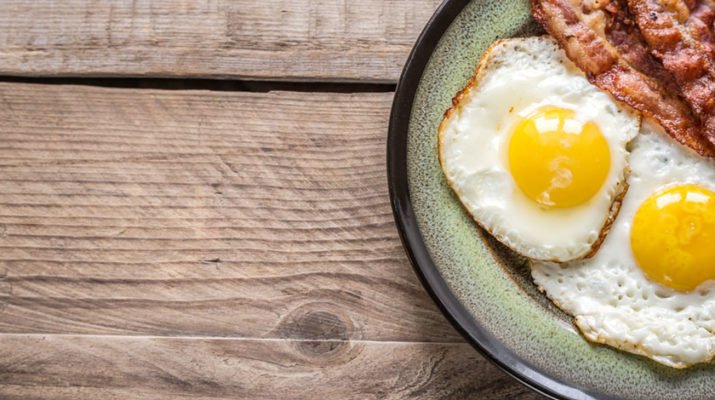By Deborah Jeanne Sergeant
 Celebrity doctor Mehmet Oz recently said that people should skip breakfast. That seems to fly in the face of the age-old adage that breakfast is the most important meal of the day and the means to jumpstart the metabolism, but Oz explained that most people respond to society cues to eat, whether they need the calories or not.
Celebrity doctor Mehmet Oz recently said that people should skip breakfast. That seems to fly in the face of the age-old adage that breakfast is the most important meal of the day and the means to jumpstart the metabolism, but Oz explained that most people respond to society cues to eat, whether they need the calories or not.
Oz explained that eating later in the evening causes the hormones to make the body crave calories — primarily carbohydrates — first thing in the morning. Stopping eating around 7 p.m. resets the hormones so that by 7 the following morning, the body has been fasting 12 hours and it doesn’t feel hungry right away. He added that the data comes from animal research and anecdotal input from professional athletes.
Oz’s advice seems to correlate with emerging research on intermittent fasting, which advocates for eating only during eight hours of the day and abstaining from food for the rest of the 24-hour period. Oz believes that skipping breakfast can help people not only maintain healthful weight, but also perform better both physically and mentally, and even age more slowly.
He also believes that it’s an easy way for people to lose weight and maintain healthful weight, since it doesn’t involve counting calories or points, severe food restrictions or continual efforts (although eating a generally healthful diet of moderate calories is still a good idea).
Even when eating the same number of calories over an eight-hour period compared with an 18-hour period, people tend to lose weight, according to Oz. Also as part of his System 20 eating plan, adherents are permitted a cheat day so their bodies don’t get in a rut — and they can enjoy an occasional breakfast out. Or, instead of skipping breakfast, they can skip dinner that evening to maintain the eight hours of eating.
Debbie Wolfe, a home and lifestyle writer based in the metro Atlanta area, posted in February on She Finds, “if you think skipping breakfast will help you lose weight faster you may be making a big mistake.”
She bases this on the low blood glucose levels people have after not eating for 12 hours since their previous evening’s dinner.
“When you wake up, your glycogen stores are low,” Wolfe wrote. “Glycogen is the glucose that has been stored in your muscle and liver tissues and is released slowly so your blood sugar levels are stable overnight. When you skip breakfast in order to fast, all of the energy from the glycogen stores is used up, your body starts to break down fat to produce energy. You may lose weight with this method, but you can also experience reduced energy levels and fatigue.”
She added that eating breakfast can add a nutritious boost to the day, improve energy levels and metabolism and prevent poor food choices later.
Dennis Lesniak, doctor of chiropractic, has a master’s in clinical nutrition and bachelor’s in exercise science. He works at Quarter Deck Athletics-CrossFit QDA in Buffalo and sees some merit in skipping breakfast for some people.
“When we work with our nutrition clients with a lot of different dietary strategies, we need to find something to help them be successful,” Lesniak said. “If you eat breakfast every day and it’s something you enjoy and feels good with you, keep at it. If you hate eating breakfast and you’re only making bad choices like [eating] a muffin, pancakes, waffles or cereal, skipping it might help you make better choices.”
He believes that it’s all about cumulative nutrition strategies throughout the day. But for people who want to lose weight, it’s essential that they can maintain their weight loss strategy long-term.
Mary Jo Parker, registered dietitian with Nutrition and Counseling Services in Buffalo, believes that Dr. Oz is oversimplifying the case for intermittent fasting by saying that since animal research shows some positive metabolic change while fasting, “there is insufficient evidence that the same occurs with humans,” Parker said. “What we know is that if people fast for a prolonged period of time, they may have weight loss results, but most researchers attribute this to eating less in a 24-hour period versus any significant metabolic change.”
While she acknowledged that anecdotal evidence shows some people seem to benefit from intermittent fasting, it cannot be called a one-size-fits all weight loss solution. Instead, she wants people to focus more on reducing intake of processed foods and to emphasize eating more whole foods, natural fiber, healthy fats and a plant-based diet.
“This is the healthiest way to eat and I think it will catch on more,” Parker said.
Laura M. Anderson, Ph.D., assistant professor and licensed psychologist and director of the PULSE Healthy Weight Research Team at University at Buffalo, said she used to strictly adhere to calories in versus calories out for weight loss; however, she said that if intermittent fasting helps individuals and they can stick with it, it can be a helpful tool for weight loss.
“Many on intermittent eating say that it’s like their brain is reset,” she said. “They say all the organs are more in synch.”
Overall, people should try to eat a healthy diet and stop when they’re full.
“Roast veggies, make your own foods, eat things that don’t have so many ingredients,” Anderson said. “It all boils down to no diet ever. You want it sustainable forever to prevent weight regain.”
Though not a big fan of breakfast cereal, Anderson said that anyone who wants to eat breakfast should. She suggests foods that contain protein, along with a little healthful fat and produce, such as Greek yogurt with fruit and nuts.

